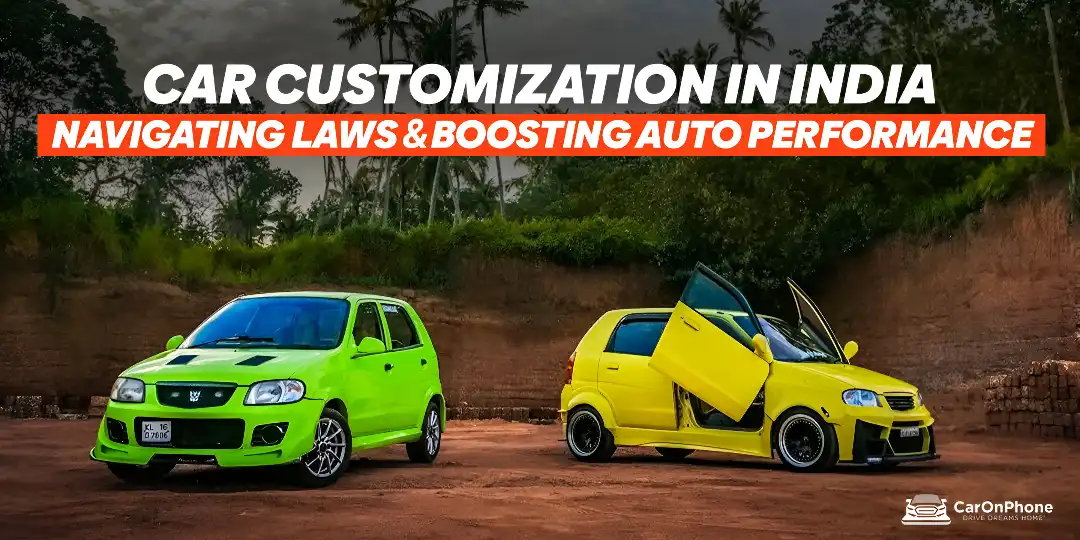
Login to your account
Enter your mobile no. to receive one time password!
OTP Verification
Please enter the one-time password sent to your phone.
OTP Successfully sent to +91-XXXXXXXXXX

Think of your car as a blank canvas. When you choose to upgrade your ride, you speak a language of style and power. Yet you also tap into the world of car modification laws India to stay on the right side of the law. This mix of creativity and compliance is what makes customizing so exciting.
Why do we love tweaking our vehicles and chasing that perfect sound and stance? Let’s find out.
You roll up to an event and hear engines growl differently, lights flash in unique patterns, and find interiors as vivid as film sets.
That thrill comes from expressing who you are through a machine you spend hours in every day. Personal touches—seat fabrics, stereo setups, unique alloys—turn a factory car into your personal statement.
Beyond style, some of us chase that extra shove when you plant your foot at a green light. That’s where performance upgrades India come into play, giving you sharper throttle response, tighter handling, and sometimes even better fuel efficiency.
When you plan a body wrap or engine swap, you’re touching rules baked into the Motor Vehicles Act of 1988.
Section 52 prohibits altering your vehicle so it results in its registration details differing from the manufacturer’s original specs.
In January 2019, the Supreme Court reiterated that any change diverging from the stock chassis, engine, or dimensions counts as illegal modification unless formally approved by your RTO.
But not every tweak is a crime—repainting your car in a fresh color is allowed if you update your RC to reflect the new hue. Even vinyl wraps need no pre-approval, though the RC should match post-wrap color changes.

RTO rules for modified cars demand that you get official approval for any change that impacts these elements: safety, emissions, noise levels.
If you’re planning to swap your engine, install a loud exhaust, or widen your track, you need to submit an application with technical drawings, original RC, and PUC certificate to make this happen.
After an inspection, the RTO either stamps your upgrade or slaps you with a penalty. Worse, they’ll cancel your registration altogether.
Simple aesthetic touchups like permitted tire upsizing, decals, or interior fittings usually flies under the radar. But always check with your local RTO, because state offices can interpret the Motor Vehicles Act and Central Motor Vehicle Rules in slightly different ways.

Unleashing hidden horsepower and torque starts with ECU remapping—aka chip tuning.
Mechanic-talk incoming…
All these mods highlight why car tuning in India has surged among passionate drivers who want real track-inspired vibes when they’re behind the wheel.
The apex court’s January 2019 verdict emphasized that any alteration to a car’s structural specs without RTO approval is illegal.
That case arose after the Kerala High Court had allowed certain “structural changes” under state rules. The Supreme Court quashed that, clarifying that Rules can never override the Act.
Any differences between RC entries and original specs—be it chassis, dimensions, or engine—means your car is technically unregistered (in its current form). You could face fines or vehicle seizure as a result.
First, draft your dream list. Pick the styling and performance parts that matter most. Then categorize each upgrade:
A smooth process means enjoying those new alloys or chip tune without looking over your shoulder each time you drive.

From Bangalore’s Wolf Moto pioneers in ECU recoding to Delhi’s KS Motorsport mastering chip and gearbox maps, the tuning scene has grown robust.
Quantum Tuning brings global remap standards with a 30-day money-back guarantee. CODE6 and Revo trace their dyno-tested roots back to motorsport, offering software and hardware bundles.
Always look for brands with documented performance numbers and dealer networks across India. That way, you get reliable support if you ever switch vehicles or relocate.

Yes, unapproved mods can raise red flags during resale or repairs. Interested buyers may start haggling harder if they spot non-original parts.
Insurance carriers, on the other hand, might drop your policy renewal if they discover unlisted modifications. This is especially if those changes affect emissions or safety.
To protect your investment, keep a mod log. This includes invoices, installer certifications, dyno sheets, and RTO approvals. Transparency reassures insurers and buyers, telling them your custom ride is legal, already inspected, and properly maintained.
Customizing your car in India feels like adding your signature to every turn and straight line. But the thrill of fresh alloys, a throaty exhaust note, and sharper handling must coexist with car modification laws India and RTO rules for modified cars.
Follow Supreme Court guidance, respect Section 52 of the Motor Vehicles Act, and work with certified tuners. Then get behind the wheel knowing your ride looks great, feels faster, and won’t land you in legal hot water.
After all, the best mods and customizations are ones you can enjoy long after installation.
CarOnPhone is your one-stop destination to see all upcoming cars, latest cars, released cars, and EV Cars, and compare Cars in all Car Brands. Stay tuned and follow us to update yourself on the automotive world.

